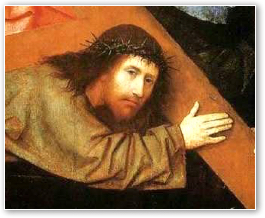Understanding Christ's Suffering and Ours
- FATHER ERASMO LEIVA-MERIKAKIS
A vision of glory without subsequent immersion in suffering would be a cheap trick of magic or a psychological delusion;
 ...and suffering at the mercy of men's hands without the certain hope of glory would plunge any mortal into despair. Step by step, Jesus is teaching his followers that even an incarnate God must enter into solidarity with the Elijah persecuted by Jezebel (1 Kgs 19:2), with the John the Baptist martyred by Herod, Herodias, and their guests, and with all prophets, official or not, who bear witness to the truth by offering their flesh to the violence of men.
...and suffering at the mercy of men's hands without the certain hope of glory would plunge any mortal into despair. Step by step, Jesus is teaching his followers that even an incarnate God must enter into solidarity with the Elijah persecuted by Jezebel (1 Kgs 19:2), with the John the Baptist martyred by Herod, Herodias, and their guests, and with all prophets, official or not, who bear witness to the truth by offering their flesh to the violence of men.
Beaming with the vision of glory shining from Jesus' face at the Transfiguration, the Apostles must now go back down the mountain with Jesus into their common valley of tears. This vision will not make sense, says Jesus, until the Son of man rises from the dead (Mt 17:9b). Fugitive glory, now buried deep in the heart through the wound of love, promises inalienable glory in the end. But the passageway leading from one to the other is narrow and dark and silent, like the uterine birth canal. And not only in the total scheme of the Gospel does the Transfiguration precede the Passion, which in turn precedes the Resurrection: even within our very short passage the positioning of glory and suffering brings surprising consolation. Jesus first commands the Apostles to put away the vision of glory deep in the silence of their hearts until he rises from the dead; and only after comforting their hearts with this injunction to a silence pregnant with hope does Jesus then in the end mention the inexorable necessity of suffering, his suffering.
The Lord never leads his followers into rough terrain without himself taking the lead and braving the darkness alone. His suffering always intends to personalize our own. Christ removes the horror of anonymity and aloneness from our suffering by taking it into his hands before it ever begins and by impressing upon it the prints and the stress of his tender care. "Give me your suffering even before you suffer it! I want to make it my own, to foresuffer your deepest agony in my own Heart, which is wide enough to contain the sorrows of all. In this way, when you enter into the darkness of your own solitude you will find me there already waiting for you to join me. Your suffering will be my suffering even before it becomes yours, so you will never be alone." If the Son of Man must suffer many things at the hands of men it is only because he wants to unburden them by making all their sin and its results pass over into himself.
 This is Meaghen Gonzalez, Editor of CERC. I hope you appreciated this piece. We curate these articles especially for believers like you.
This is Meaghen Gonzalez, Editor of CERC. I hope you appreciated this piece. We curate these articles especially for believers like you.
Please show your appreciation by making a $3 donation. CERC is entirely reader supported.

Acknowledgement
Father Erasmo Leiva-Merikakis. "Understanding Christ's Suffering and Ours." excerpt from Fire of Mercy: Heart of the Word: Meditations on the Gospel According to Saint Matthew Vol. 2 (San Francisco: Ignatius Press, 2003).
Reprinted with permission of the publisher, Ignatius Press.
The Author

 Erasmo Leiva-Merikakis received his Ph.D. in Comparative Literature and Theology from Emory University. His areas of interest include liturgy and liturgical texts, Georg Trakl's poetry, the Gospel of Matthew, French and German poetry of the late nineteenth and early twentieth centuries, Greek and Roman classics, and Dante. He is the author of Fire of Mercy: Heart of the Word, a two-volume commentary on the Gospel of Matthew, Love's Sacred Order: The Four Loves Revisited, and The Way of the Disciple. He has also translated numerous works for Ignatius Press.
Erasmo Leiva-Merikakis received his Ph.D. in Comparative Literature and Theology from Emory University. His areas of interest include liturgy and liturgical texts, Georg Trakl's poetry, the Gospel of Matthew, French and German poetry of the late nineteenth and early twentieth centuries, Greek and Roman classics, and Dante. He is the author of Fire of Mercy: Heart of the Word, a two-volume commentary on the Gospel of Matthew, Love's Sacred Order: The Four Loves Revisited, and The Way of the Disciple. He has also translated numerous works for Ignatius Press.




